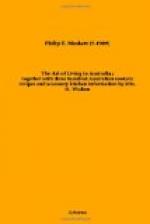In addition to the foregoing, coffee is also employed by reason of its important medicinal virtues. In malarious countries a cup of hot strong coffee, in the early morning, is regarded as a preventive against fever and ague. It is a valuable agent in many cases of heart disease, particularly when associated with dropsy. In Bright’s disease of the kidneys, where dropsy is present, it is likewise given with benefit. Strong coffee is also a well-known remedy in asthma, both in relieving the actual attack and in acting as a restorative after it is over. It frequently gives great relief in many forms of nervous headache, particularly in that variety known as migraine, in which the pain is generally limited to one side of the head. And, lastly, coffee is a valuable remedy in opium poisoning, where there is such a tendency to a fatal coma.
From the foregoing it must be evident that coffee occupies a very high position as a beverage. All that concerns its preparation, therefore, is of undoubted interest. In the first place, to obtain coffee in perfection it is indispensable that the beans be roasted at home, and not only should the roasting be done in the house, but the operation ought really to be performed immediately before the coffee is made, and the reasons thereof I shall give in speaking of the process of roasting. Many people do not care sufficiently about the perfection of coffee to go to this trouble, and are content with having their roasted coffee beans sent to them daily from their grocer. The leading establishments roast their coffee beans daily, and from them the latter may be obtained and ground in the mill at home. This, of course, though not giving the real thing, is an immense improvement on the hallowed tradition, so dear to some, of purchasing their weekly supply of,,round coffee at a time and keeping it in a tin or vessel for use as required. But, as I said before, if perfection is aimed at, the roasting must be done at home.
In the selection of the green beans care should be taxiway to see that they are nearly all of the same size, for if some are small and others large, when it comes to roasting it will be found that the small ones are done to a cinder, while the larger beans are hardly touched. The beans, too, should be perfectly dry; if moist, they should be dried in a dish by the fire or in the oven before going into the roaster. On the coffee plantations the drying of the bean is considered a most important matter when preparing them for export.
In the process of roasting, a volatile oil which gives to coffee its unique fragrance is developed. It is somewhat curious that no amount of boiling could educe this from the raw bean. This oil is exceedingly volatile, and begins to disperse and evaporate the very moment it is born. Hence, to obtain the perfection of coffee, no time should be lost in grinding and making it directly it is roasted. When the fragrant vapour of the roasted bean is first given off, it is soon followed by a peculiar noise, caused by the splitting and crackling of the external silvery greenish covering of the raw beans. At this time, or very shortly afterwards, the latter are of a yellowish hue, but before long they change into that desirable lightish brown colour, when the peculiar volatile coffee oils are at their best.




